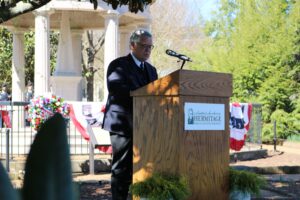
One of the first signs visitors encounter as they drive up the long, winding road to Hermitage reads, “Andrew Jackson, the People’s President.”
But Dante Reyna, the president of the Indigenous Scholars Organization at Vanderbilt, doesn’t feel that way.
 “It’s a little daunting to have an Indian mass murderer and a slave owner be held up to such a high standard,” said Reyna, part of a small group who protested outside Jackson’s presidential home. “And actually, the truth is quite the contrary.”
“It’s a little daunting to have an Indian mass murderer and a slave owner be held up to such a high standard,” said Reyna, part of a small group who protested outside Jackson’s presidential home. “And actually, the truth is quite the contrary.”
Wednesday marked former President Andrew Jackson’s 256th birthday. Jackson, one of three presidents to hail from Tennessee, is known for reducing the federal debt, consolidating presidential power and forcibly removing the Cherokee Nation from its lands through the Trail of Tears.
At a birthday celebration at the historical site, local Indigenous activists protested the controversial figure.
Meanwhile, inside the gates, Mayor John Cooper and the Tennessee National Guard gathered to commemorate the seventh U.S. president.
 Courtesy Andrew Jackson Foundation
Courtesy Andrew Jackson FoundationMayor John Cooper speaks at the wreath laying ceremony at Andrew Jackson’s Hermitage, celebrating his 256th birthday.
The Andrew Jackson Foundation’s President and CEO, Howard Kittell, said the ceremony is an important tradition.
“It’s a wonderful opportunity to think back to think about what that president accomplished, the complications that that president brought with him,” Kittell said.
He acknowledges Jackson remains a “controversial” figure, and did not take issue with the protest going on outside.
“We don’t want the experience for our guests to be interfered with,” Kittell says. “But we certainly want people to voice their opinions, just as Jackson did in his time.”
The Hermitage now includes tours highlighting the history of enslavement on the property, which draws nearly 200,000 thousand visitors each year.
But many of the protestors criticize the continued reverence of Jackson — including on the $20 dollar bill. An effort to replace Jackson with Harriet Tubman on the currency was postponed during the Trump administration.
Melba Checoate-Eads, a speaker and Muscogee Creek Nation citizen, said that American Indian removal stands as the core of his legacy. She noted the crowd of protesters, which numbered 15 people.
“If we were still here actually, with chiefs and towns and all the things once that were here, there would probably be a thousand people standing around here,” Checoate-Eads said. “And you can look at the numbers and that’s not so many, because we’ve been exiled from this place.”
Checoate-Eads hopes they can find some way to reconcile Jackson’s brutal legacy with the triumphant survival of her people.
 Cindy Abrams WPLN News
Cindy Abrams WPLN NewsIndigenous activist Albert Bender, center, stands among protesters outside of Andrew Jackson’s Hermitage.

